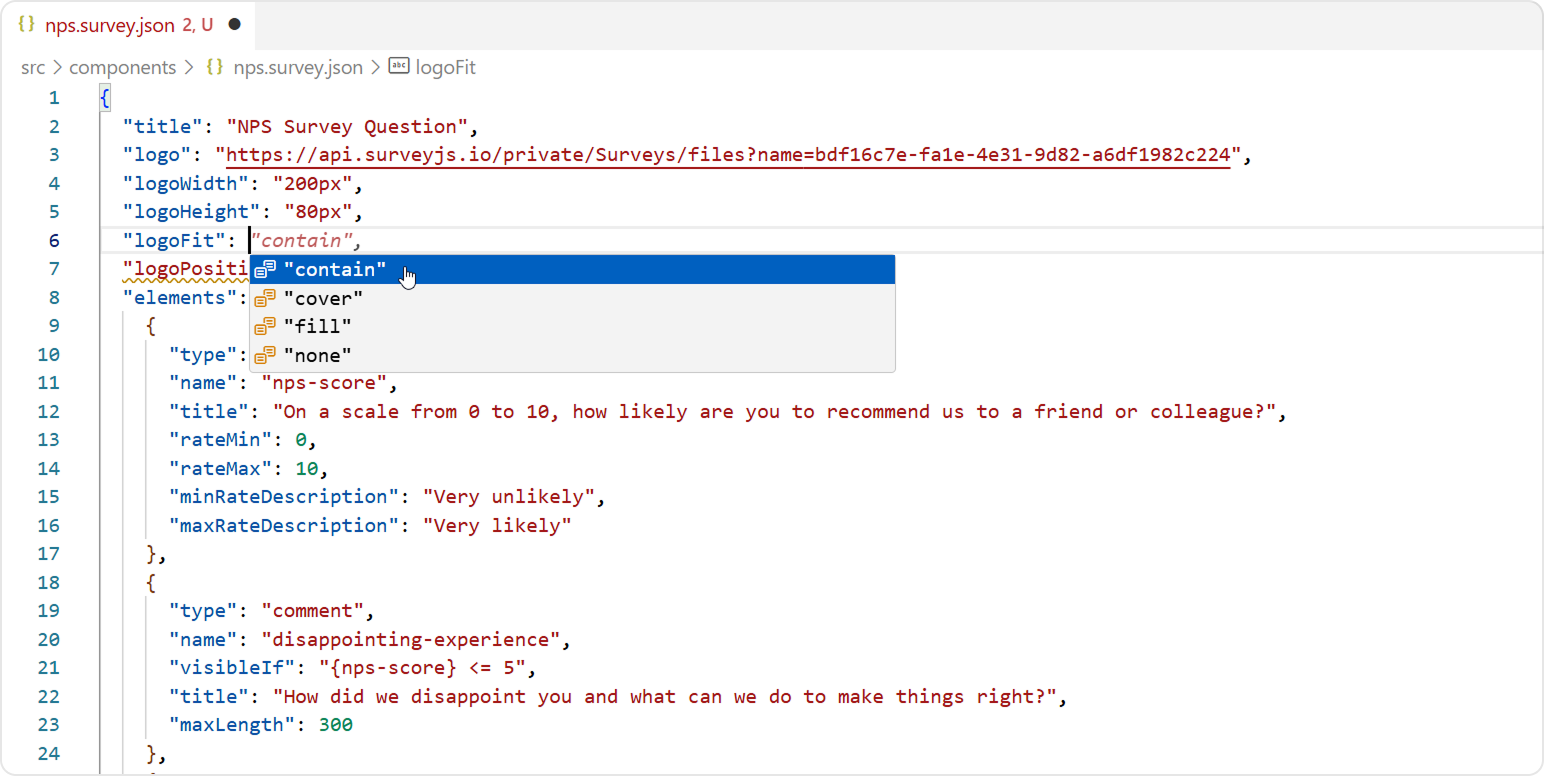Edit and Validate Survey JSONs in Visual Studio Code
Defining surveys in JSON can be error-prone without proper tooling. Visual Studio Code (VS Code) provides IntelliSense, validation, and formatting for JSON files, and with the SurveyJS JSON schema, you can bring these features into your survey development workflow.
This guide shows you how to configure VS Code to recognize SurveyJS JSONs, whether you reference the schema locally or from a CDN, and how to use these validated files directly in your application.

Obtain the SurveyJS JSON Schema
You can access the SurveyJS JSON schema in two ways:
survey-corenpm package
Once installed, the schema is available at:
node_modules/survey-core/surveyjs_definition.json.- CDN
Use the following URLs to fetch the schema online:- Latest version:
https://unpkg.com/survey-core/surveyjs_definition.json - Specific version:
https://unpkg.com/survey-core@VERSION/surveyjs_definition.json
Example:
https://unpkg.com/survey-core@2.3.8/surveyjs_definition.json
- Latest version:
Configure VS Code to Use the Schema
Option 1: Configure Workspace Settings
Add the schema mapping to your workspace settings (.vscode/settings.json):
{
"json.schemas": [
{
"fileMatch": ["src/surveys/*.json"],
"url": "./node_modules/survey-core/surveyjs_definition.json"
}
]
}
fileMatch- Applies the schema to all JSON files inside thesrc/surveysdirectory.url- Specifies the schema's URL or path to the schema file relative to the workspace root.
With this setup, VS Code will automatically provide property suggestions, autocomplete, and validation when you edit survey JSONs.
Option 2: Reference the Schema in Survey JSON Files
Alternatively, you can declare the schema directly in each JSON file using the $schema property. This approach makes the JSON self-contained, so IntelliSense and validation work immediately without additional VS Code settings. It's especially useful if different survey JSON files target different SurveyJS versions.
When referencing a local schema, use a path relative to the JSON file:
{
"$schema": "../../node_modules/survey-core/surveyjs_definition.json",
"title": "NPS Survey",
"pages": [
{
"name": "page1",
"elements": [
{
"type": "rating",
"name": "nps_question",
"title": "How likely are you to recommend us?"
}
]
}
]
}
Once your survey JSON files are ready, you can import them into your application and render surveys with SurveyJS components. For example, in React:
// Survey.tsx
import 'survey-core/survey-core.css';
import { Model } from 'survey-core';
import { Survey } from "survey-react-ui";
import npsSurvey from "../surveys/nps.json";
export default function SurveyComponent() {
const survey = new Model(npsSurvey);
return <Survey model={survey} />;
}
Conclusion
By connecting the SurveyJS JSON schema with VS Code, you unlock the full power of IntelliSense:
- Autocomplete reduces typing effort and helps discover available properties.
- Validation prevents errors by flagging invalid or misspelled fields.
- Formatting and tooltips improve readability and provide inline documentation.
This setup makes editing survey JSONs faster, more accurate, and less error-prone, so you can focus on designing great surveys rather than debugging JSON.